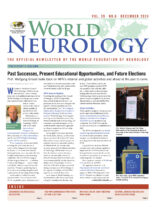Primary health care providers and the Stroke Center at Central City Clinical Hospital in Almaty, Kazakhstan, collaborate on stroke prevention.
By Aida Kondybayeva
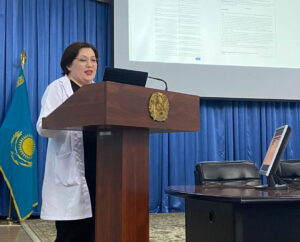
Aida Kondybayeva, MD, PhD, FEAN, Head of the Scientific and Educational Center for Neurology and Applied Neurosciences» at Asfendiyarov Kazakh National Medical University.
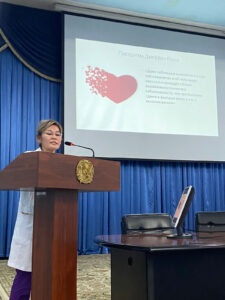
Aliya Abenova PhD, Deputy Director for Medical Affairs, Central City Clinical Hospital, Almaty.
“Stroke and Cardiovascular Disease Prevention: Time to Action!” was the theme of a World Stroke Day event, which was held on Nov. 5, 2024, at the Central City Clinical Hospital in Almaty, Kazakhstan. Organized by Asfendiyarov Kazakh National Medical University and the Central City Clinical Hospital of Almaty, the meeting brought together health care professionals to discuss new approaches in stroke prevention.
The speakers shared current data on a range of topics:
- Aziz Ismailov, head of the Stroke Center at Central City Clinical Hospital in Almaty, presented statistics and key indicators of the center’s work.
- Makpal Makasheva, a medical expert from the Situational-Analytical Center at Outpatient Clinic 4 in Almaty, shared an analysis of stroke and cardiovascular diseases in the Bostandyk district.
- Gauhar Kasenova, deputy director of outpatient services at City Hospital 5 in Almaty, discussed data from the Medeu district.
- Aida Kondybayeva, MD, PhD, FEAN, head of the Scientific and Educational Center for Neurology and Applied Neurosciences at Asfendiyarov Kazakh National Medical University, highlighted the need to rethink approaches to stroke prevention.
- Aliya Abenova, PhD, deputy medical director at Central City Clinical Hospital, discussed methods for preventing recurrent strokes and complications.
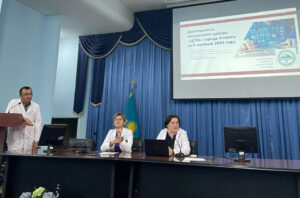
Aziz Ismailov, Head of the Stroke Center at the Central City Clinical Hospital, Almaty, speaks with panelists.
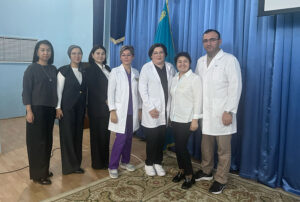
Faculty of the World Stroke Day event.
The discussions underscored the importance of establishing a strong and collaborative framework between primary health care (PHC) providers and specialized stroke centers to ensure a comprehensive approach to stroke prevention and patient care. This collaboration aims to bridge the gap between early intervention and specialized treatment, offering a continuum of care that addresses both preventive measures and timely response for high-risk patients.
Participants emphasized that by aligning efforts, PHC services, and stroke centers can create a more effective system that improves patient outcomes, reduces the risk of recurrent stroke events, and ultimately strengthens public health efforts in combating stroke-related challenges.
Aida Kondybayeva, MD, PhD, FEAN, is head of the Scientific and Educational Center for Neurology and Applied Neuroscience at Asfendiyarov Kazakh National Medical University.
